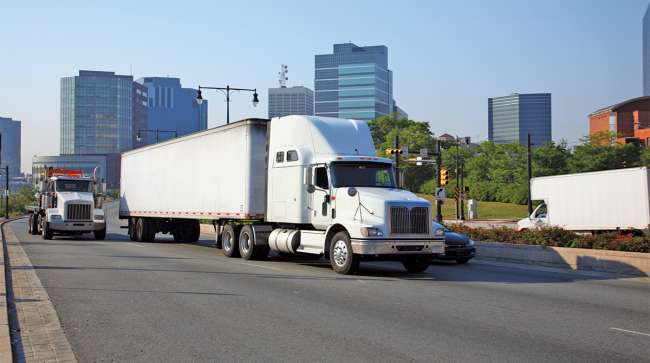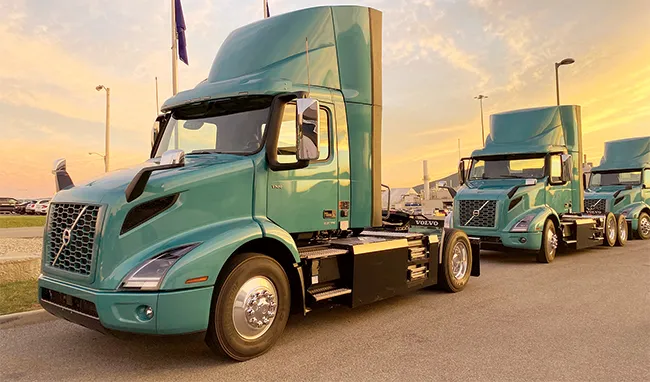Trucking Insurance Concerns Go Beyond High Premiums

[Stay on top of transportation news: Get TTNews in your inbox.]
For some time, the trucking industry has been struggling with rising insurance coverage, but risk management issues also plagued fleets this year. Although high premiums have been a top concern, industry leaders and state regulators have taken action to curb other insurance challenges that greatly affect the industry at large.
For instance, the California Department of Insurance, the nation’s largest state consumer protection agency, took steps to ensure that commercial insurance coverage is available for zero-emission heavy trucks and fleets as the state moves to outlaw diesel-powered vehicles.
“We are at the beginning of a major transition to zero-emission trucks, and we know that new technologies can face challenges finding insurance,” Michael Soller, spokesman for the department, told Transport Topics. “Commissioner Ricardo Lara is taking a forward-looking approach to identify solutions proactively, before we face problems that slow us down.”
In October last year, Gov. Gavin Newsom enacted Assembly Bill 844, which directed the state Department of Insurance, under the control of the insurance commissioner, to take a series of actions to assist the trucking industry in having available and affordable commercial vehicle insurance for zero-emission heavy vehicles.
The bill was supported during the last session of the California State Assembly by the California Trucking Association, California Department of Insurance, California Environmental Voters and Calstart Inc.

Volvo VNRs at the New River Valley Plant. The California Department of Insurance was directed to conduct surveys and data calls to obtain specific information, such as whether an insurance company offers insurance for zero-emission trucks. (Connor Wolf/Transport Topics)
The goal is to enable the public to know which insurance companies offer insurance for trucks or fleets using different zero-emission technologies and any relevant coverage limits or fleet size specifications.
Another objective is to identify potential barriers for expanding insurance options and provide both state insurance and air quality regulators with critical information for potential state policy changes.
RELATED: How Carriers Are Taming Insurance Costs
“We are committed to help accelerate the transition to clean-air technology by making sure truck fleets have the tools necessary to access insurance,” Soller noted.
The state Department of Insurance worked to fulfill the legislative requirements of AB 844 to collect data from insurance companies. The department was directed to conduct surveys and data calls to obtain specific information, such as whether an insurance company offers insurance for zero-emission trucks.
Company responses are to be kept confidential. However, Lara’s office is required to publish the information in the aggregate without identifying an individual respondent or insurer. Also, the state Department of Insurance is to create and maintain a link on its website providing public access to this aggregate information. The department, in consultation with the California Air Resources Board, is required to make the public aware of information and insurance options for battery-powered, hydrogen-powered, and/or other zero-emission advanced truck technology.
“This data call will allow the department to create a list of insurance companies that provide this coverage,” Soller explained. The department has already “issued a circular to all admitted insurers writing commercial auto, which is the line of insurance we identified as being appropriate.”

Fusable Risk Intelligence‘s Chad Krueger (left, with Rob Moseley, founding partner at Moseley Marcinak Law Group) speaks at the Safety, Security and Human Resources National Conference and Exhibition. (Mindy Long for American Trucking Associations)
When asked if there is a penalty for insurance companies failing to provide survey information, Soller said, “The department has an excellent response record to our data calls. We do not foresee this as a problem.”
By Jan. 1, 2025, the department must create a strategy to address current and future insurance gaps for new heavy-duty truck technologies, including the possible establishment of a risk pool and other tools to offer insurance to truck fleet businesses and individual truck owners unable to find insurance in private insurance markets.
In February this year, the New Jersey Legislature passed a law requiring heavy trucks to carry a minimum $1.5 million in liability insurance — double the current federal minimum insurance requirement of $750,000.
Under the new law, the owner or a registered owner of a commercial motor vehicle weighing more than 26,000 pounds will be required to maintain motor vehicle liability insurance coverage of at least $1.5 million to insure against loss resulting from liability imposed by law for bodily injury, death and property damage.
Earlier attempts to pass the law, which went into effect last month, were hung up in the Legislature for more than a year before the bill was signed into law by Democratic Gov. Phil Murphy on Jan. 16.
The current Federal Motor Carrier Safety Administration standard requiring carriers to maintain a minimum of $750,000 in liability insurance has been in place since 1985. Although the agency has kicked around the notion of raising the insurance minimum requirement, in a 2022 report it concluded it could not find the justification to do so.

The National Motor Freight Traffic Association hosted a discussion on increasing cybersecurity threats as part of its Digital Solutions Conference. From left: Antwan Banks, Ernesto Ballesteros, Shelly Thomas, Takeda Parker-Bradford of the Transportation Security Administration, and Clarke Skoby. (Connor D. Wolf/Transport Topics)
“In order for FMCSA to adequately assess the sufficiency of the financial responsibility requirements, the agency would need access to more detailed information from the insurance industry, including claims data,” the report said.
Although there are clear indications that litigation jury verdicts and settlements are on the rise, “catastrophic motor carrier crashes are relatively rare,” according to a 2013 study by the John A. Volpe National Transportation Systems Center cited in the FMCSA report.
The law has faced strong opposition from such trade groups as American Trucking Associations, the New Jersey Motor Truck Association, the Truck Renting and Leasing Association, the New Jersey Warehouse and Movers Association, and others.
Jeff Loftus of FMCSA joins TT’s Seth Clevenger to discuss the current outlook on ADAS technology and how it will affect the industry at large. Tune in above or by going to RoadSigns.ttnews.com.
It does not specifically say whether the law is intended to just cover New Jersey-based carriers, or interstate carriers conducting business in the state.
ATA has called the new law at a minimum “bad policy,” and has cautioned if interstate truckers passing through or doing business in the state were subject to the law it could result in a legal challenge.
As a way to navigate the hurdles of risk management, industry leaders this year have been acutely aware of the dangers ahead. During American Trucking Associations’ Safety, Security and Human Resources National Conference and Exhibition last May, Chad Krueger, vice president and managing director of insurance at Fusable Risk Intelligence, said the insurance industry is under pressure from litigation costs, catastrophic losses and weather-related disasters, which are all becoming more expensive. In response, insurance carriers are raising rates.
“The insurance carriers are trying to get back in the black. A 110% or 115% loss ratio is not uncommon,” Krueger said, adding that insurance carriers are trying to ingest as much data as possible to try to get ahead of losses. “Social inflation is compounding with accident volumes to drive up total loss cost,” he explained.
There is an increasing appetite for self-insurance and captive groups. However, it can be challenging to get into a captive group.
“Those are carriers that are vetted and doing a very good job with their safety,” Krueger explained.
In addition to premium struggles, fleets and trucking companies are battling cybersecurity concerns that have been a rising threat for the industry. In November 2023, the National Motor Freight Traffic Association held a discussion as part of its Digital Solutions Conference in Houston. The two-day event brought together transportation and cybersecurity experts to identify issues and talk about best practices.

Leonard’s Express’ Chris DeMillo says continuing education for a fleet’s end user
is needed to help defend from outages and cyber threats. (Leonard’s Express)
“With regard to the tactics around social engineering, obviously with AI and making them more realistic, and then also just with the evolving privacy regulations, I think we’re going to continue to see that evolve, especially with AI and what that looks like,” said Shelly Thomas, senior vice president at risk management firm Marsh. “I don’t think anyone really knows exactly what that looks like, but just in regard to copyright infringements, I think we may see more around that with regard to AI.”
Thomas recommended that companies consider getting cybersecurity insurance. She noted that they should be checking vendor contractual requirements to ensure that they’re meeting requirements from a cybersecurity insurance perspective. She has been seeing a lot of contracts requiring higher limits.
However, the best way to alleviate cybersecurity insurance concerns is to properly prepare the IT infrastructure.
“Several layers need to be built into the IT infrastructure to protect intellectual property and business operations,” said Chris DeMillo, vice president of information technology at Leonard’s Express. “Multifactor authentication, complex passwords and network hardening are a must. We invest in continual education for end users and have a disaster recovery vendor help monitor backups and perform routine test outages.”
Leonard’s Express ranks No. 85 on the Transport Topics Top 100 list of the largest for-hire carriers in North America.
Mindy Long also contributed to this article.
Want more news? Listen to today's daily briefing below or go here for more info:





